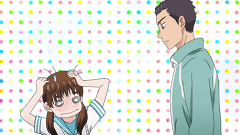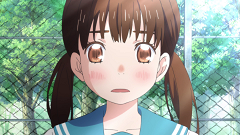Before I launch into things here, allow me to express my apologies for the double episode review. 3-gatsu is the type of show that ought to receive weekly coverage, but I’ve been busier than usual during the past month. Among my list of preoccupations was a marathon of the 3-gatsu manga, which I couldn’t stop myself from reading once the bullying arc began. Before I knew it, I was caught up, and the agonizing year-long wait for new material had begun. How great is it that there are still fifteen episodes left this season to help tide me over? I can’t wait to watch each one, and hopefully blog about them not too long after they’ve aired. (For anyone wondering how the manga compares to the show, I’d say it manages to be even more emotional despite the limitations of its format – I can’t recommend it enough.)
For several episodes now, Rei has been thinking about what kind of help he can offer to Hinata during this difficult period. He has a plan to support her financially, should that become necessary, and he’s made himself a constant presence in her life, keeping the promise he made by the river in “Ladybug Bush (Part 2).” But now he’s approaching the problem as directly as he can, by asking her to describe her school life little by little. Rei even uses his connection with Hina’s schoolmate (and crush) Takahashi to provide her with an escape route during her unbearable lunch hour. Though Takahashi is certainly doing her a favor by springing her from that oppressive environment, he misses the mark in another way. As the two of them play catch, his hard throws cause Hinata to yelp in pain, but he denies that the pitches were fast enough to warrant that response. He can’t understand that stinging sensation because he doesn’t share her perspective, the same way that those who minimize the negative effects of bullying don’t realize how damaging it is. Maybe I’m reading too far into the scene, but it seems like the show is presenting this solution to Hina’s isolation as a temporary, imperfect one.
Of course, Takahashi does more to help than just injuring Hinata’s glove hand. He remembers Chiho, who once gave him half of her lunch during a school trip, which gives Hina an opportunity to talk about her. He also invites Takagi (the head bully) and her friends to play catch, only to intimidate them by using his full strength, sending a clear message that his friends aren’t to be messed with. But his involvement in their class backfires when the jealous Takagi (or one of her flunkies) scrawls an insulting message on the chalkboard, and their teacher sidesteps the issue by calling Hinata “uncooperative.” The look on her face at the end of “Letter” closely resembled one of Kyouko’s bitter facial expressions, which is a scary parallel to consider. Hina describes the anger she feels in the episode’s most striking segment, which featured violent colors splashed on a dark background, closely matching her desire to beat the bullies in her class to a pulp. Despite her bottled-up rage, though, the conclusion to this scene was more sad than anything else, as we learn that Chiho is now at a rehab center, having failed to attend her new school. For all that Hina has had to endure, she’s proven to be resilient, but the same treatment was enough to break her sweet friend.
Even Akari is a victim of this awful situation, facing feelings of inadequacy as a mother to her younger sisters, and dreading the inevitable parent-teacher conference that will be arranged if Hinata continues to keep her chin up. Though Rei managed to find the perfect words to reassure her several weeks ago, he’s so moved by her plight here that he loudly proclaims his support for her before God and several dog walkers. Akari charmingly accepts, which apparently causes the younger boy’s heart to thump, but it isn’t just his heart that responds; as Rei rides the train to his next shogi match, he recalls that seeing Akari smile against the sunset like that caused a bolt of desire to shoot through him. This poses a sizeable predicament for him, since he already cares very strongly for her younger sister, though not in an overtly romantic sense. It’s hardly a surprise that Rei would feel something for Akari – not only has she showered him with attention and care since they met, but she’s a beautiful woman with a highly desirable body. The natural way that this attraction was introduced came as a relief, since there are plenty of other series that would linger on the subject for too long. We’ll see how willing the show will be to explore it as the season progresses.
Rei is forced to shut down that line of thinking before his match with Hachiya, AKA the Irritated Prince of the East. All of his ticks, from tongue clicking to fast, aggressive play, really pulled me in during their showdown. 3-gatsu is generally good at making shogi interesting for those of us without any knowledge of the game, but it slipped a bit during the back half of its first season. For me, this was a return to form, but the most interesting thing about Rei and Hachiya’s match came after its conclusion, when Yanagihara and Smith declared them to be totally alike. Like Rei, I didn’t agree with that assessment one bit – at least, not at first. During their match, Rei assumes Hachi to be totally self-absorbed, because he doesn’t think about how his noise-making affects his opponents. But despite Rei’s willingness to consider the needs of others, especially in this arc, he does have a tendency to focus inwards, likely because of the isolation he experienced at school and in his second home. This intense introspection can make him blind to the feelings of others, especially Nikaidou, whose friendship he often takes for granted. There will be an even better example of this limited perspective in a few episodes, though, so I’ll put a pin in this theory until then.




